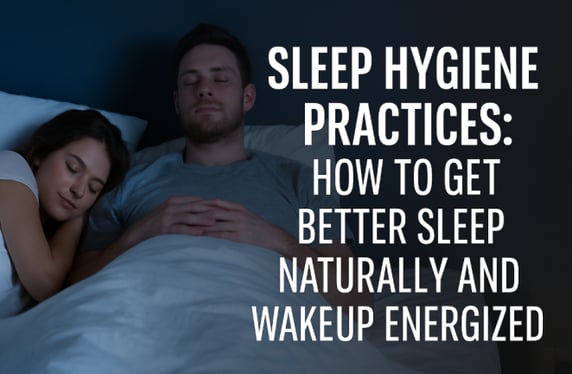Sleep Hygiene Practices: How to Get Better Sleep Naturally and Wake Up Energized
We’ve all been there: tossing and turning at night, mind racing, checking the clock at 3 a.m. wondering how you'll survive the next day. Sleep isn’t a luxury—it’s a necessity. And if you're constantly waking up tired, irritable, or foggy, your sleep hygiene practices might need a serious upgrade. This post is your real, down-to-earth guide to better sleep. We’ll break down what sleep hygiene practices are, why they matter, and how you can make small changes that add up to deeper, more restful nights. Whether you’re a chronic insomniac or just looking to improve your sleep habits, this post is packed with simple, human, and science-backed solutions.
MENTAL HEALTH
PHILIP DEVILLE
5/7/20256 min read


Sleep Hygiene Practices: How to Get Better Sleep Naturally and Wake Up Energized
We’ve all been there: tossing and turning at night, mind racing, checking the clock at 3 a.m. wondering how you'll survive the next day. Sleep isn’t a luxury—it’s a necessity. And if you're constantly waking up tired, irritable, or foggy, your sleep hygiene practices might need a serious upgrade.
This post is your real, down-to-earth guide to better sleep. We’ll break down what sleep hygiene practices are, why they matter, and how you can make small changes that add up to deeper, more restful nights.
Whether you’re a chronic insomniac or just looking to improve your sleep habits, this post is packed with simple, human, and science-backed solutions.
Table of Contents
What Are Sleep Hygiene Practices, Really?
Why Sleep Hygiene Practices Matter More Than You Think
Top Sleep Hygiene Practices to Transform Your Nights
Advanced Sleep Hygiene Practices to Go Deeper
Daily & Weekly Sleep Hygiene Schedule
Real-Life Success Stories
Q&A: Your Sleep Hygiene Questions Answered
Final Thoughts
What Are Sleep Hygiene Practices, Really?
Think of sleep hygiene practices like personal hygiene—but for your sleep life. It’s all about creating routines and environments that support high-quality rest.
This doesn’t mean you need a sleep guru or 10-step bedtime ritual. It means being intentional about:
When you go to bed
What you do before bed
How your sleep environment supports or sabotages rest
Habits during the day that impact night sleep
Fun Fact:
Most people never consider their daily habits' impact on sleep. But even your morning coffee and afternoon phone usage affect your ability to rest well at night.
Why Sleep Hygiene Practices Matter More Than You Think
Good sleep isn’t just about feeling rested—it’s about your mental, physical, and emotional health. Poor sleep hygiene has been linked to:
Anxiety and depression
Weakened immunity
Weight gain
Brain fog
Increased risk of heart disease and diabetes
On the flip side, healthy sleep hygiene practices improve:
Focus and productivity
Mood and emotional resilience
Skin health and metabolism
Long-term cognitive health
Lack of sleep affects every part of your life. Want to lose weight, feel energized, perform better, or just feel more like yourself again? Start with better sleep.
Top Sleep Hygiene Practices to Transform Your Nights
Let’s break down sleep hygiene practices you can adopt starting tonight. These are simple, free (or low-cost), and easy to implement.
1. Create a Sleep Schedule and Stick to It
Your brain and body love patterns. Going to bed and waking up at the same time every day—even weekends—helps regulate your circadian rhythm.
Set a “bedtime alarm” to start winding down
Wake up with natural light when possible
Avoid sleeping in more than an hour on weekends
2. Build a Relaxing Pre-Sleep Routine
Choose 3–4 calming activities to do every night before bed. Your body will begin associating them with sleep.
Light reading
A warm bath
Light stretching or yoga
Herbal tea
3. Upgrade Your Sleep Environment
Make your bedroom a sleep sanctuary. That means:
Cool: 60–67°F
Dark: blackout curtains or a sleep mask
Quiet: earplugs or white noise
Clean: declutter for peace of mind
4. Limit Blue Light Exposure
Turn off screens 1 hour before bed, or at least:
Use blue light blocking glasses
Enable night mode on devices
Replace screen time with books or audiobooks
5. Use Natural Light to Set Your Body Clock
Get 10–30 minutes of sunlight within 1 hour of waking up. This helps your body produce melatonin at night.
Even cloudy days offer enough light. Morning walks are gold for your sleep.
6. Avoid Big Meals, Alcohol, and Caffeine at Night
They disrupt digestion and REM cycles. Try this instead:
Eat dinner 2–3 hours before bed
Cut caffeine after 2 p.m.
Limit alcohol, or avoid entirely before sleep
7. Get Movement During the Day
Regular exercise is linked to deeper sleep. Aim for:
30 minutes of movement (walking counts!)
Avoid heavy workouts within 2 hours of bedtime
Stretching and yoga at night support calm, restorative sleep.
Advanced Sleep Hygiene Practices to Go Deeper
Ready to go beyond the basics? These advanced techniques level up your sleep hygiene practices for next-level results.
8. Try a Sleep Meditation or Body Scan
These help train your nervous system to settle.
Apps to try:
Insight Timer
Calm
Headspace
9. Write to Unload Your Thoughts
Keep a journal by your bed to:
Write down tomorrow’s to-do list
Reflect on your day
Note worries or gratitude
This clears your mind and reduces nighttime anxiety.
10. Use Gentle Sleep Aids if Needed
Talk to your doctor, but options include:
Magnesium glycinate
Valerian root tea
L-theanine
Low-dose melatonin (short-term)
Avoid long-term reliance. These should support, not replace, healthy sleep hygiene practices.
11. Keep Your Bed for Sleep and Sex Only
No laptops. No snacks. No Netflix. When your brain sees the bed, it should think “sleep.”
Daily & Weekly Sleep Hygiene Schedule
Here’s a sample weekly planner to help you build consistent sleep hygiene practices:
DayMorningAfternoonEveningMonSunlight, hydrateWalk, no caffeine after 2 p.m.No screens, stretch, teaTueLight exerciseLight lunch, no napDim lights, meditateWedJournalingOutdoor walkBath, journal, bed 10pmThuNatural lightSocialize or call friendNo social media after 8pmFriEarly startExerciseRead fiction in bedSatKeep same wake timeLimit sugar/alcoholShort yoga sessionSunSunlight + protein breakfastNo stress planningReflect, prep for week
You can customize this and turn it into a downloadable sleep hygiene tracker for readers (tip: offer it as a lead magnet).
Real-Life Success Stories
Emily, 29
“I used to dread bedtime because I just couldn’t sleep. After a month of sticking to a sleep routine and cutting screens, I’m falling asleep in 20 minutes. It’s changed my life.”
Arjun, 42
“As a shift worker, sleep was a constant struggle. I invested in blackout curtains and a white noise machine. It was a small change, but it made a massive difference.”
Lara, 34
“I journal every night now and use an herbal tea blend. I didn’t think it would help, but I feel grounded—and I haven’t had a sleepless night in weeks.”
Q&A: Your Sleep Hygiene Questions Answered
Q: How long will it take to see results from better sleep hygiene?
A: Some people see improvements within a few nights, others need 2–3 weeks. Stick with it—consistency matters most.
Q: Should I sleep in to catch up?
A: Try not to. It's better to go to bed earlier the next night than to sleep in too long. Aim for a consistent rhythm.
Q: What’s the best temperature for sleep?
A: Between 60–67°F (15–19°C) is ideal. Cooler environments promote better sleep quality.
Q: Is it bad to watch TV in bed?
A: Yes—especially close to bedtime. It stimulates your brain and exposes you to blue light. Use the bedroom only for sleep and intimacy.
Q: Can kids use sleep hygiene practices too?
A: Absolutely! Kids thrive on routine. Keep bedtime consistent and avoid screen time 1–2 hours before bed.
Q: What if nothing is working?
A: If you’ve tried consistent sleep hygiene and still struggle, speak with a sleep specialist. There could be underlying issues like sleep apnea or chronic insomnia.
My Final Thoughts
Improving your sleep hygiene practices doesn’t require perfection—just intention.
Start small. Pick 2–3 habits to work on this week. Track how you feel. Build from there.
Because good sleep isn’t just about how you rest. It’s about how you show up for your life.
You’re one good night’s sleep away from thinking clearer, feeling better, and living stronger. Let’s make it happen. 🌙✨
NOW CLICK HERE IF YOU NEED HELP: 🎁 FREE Trial: Transform Your Mind, Torch Fat, and Take Control of Your Life — Spots Are Limited, Grab Yours Now! 💥🔥💪
⚠️ Disclaimer:
This article is for informational purposes only and is not medical advice. Fasting and any diet changes may affect individuals differently. Always consult with a qualified healthcare professional before starting any fasting plan, diet, or weight loss program, especially if you have pre-existing health conditions or take medications. Results vary, and this content is based on personal experience and research. Your health and safety come first! 🚀🔥
We are affiliates. It means that we might receive a commission if you ever buy a product on our website, with no-extra cost for You of course. Thank You very much!
(Some parts of this article was written with the help of AI to provide the most effective and well-researched tips.)
Written by PHILIP DEVILLE


Empowerment
Transform your mindset for lasting weight loss.
Support
Journey
contact@mindfit.blog
© 2024. All rights reserved.
Disclaimer: We are not doctors. You should see one before starting any diet or routine in your life, especially if you are under conditions! Plus, We are affiliates. Which mean we may receive a commission if You ever purchase a product on our site, with no extra-cost for You of course! Thank You Very Much!
